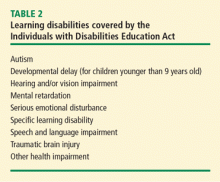Learning disorders: How pediatricians can help
ABSTRACTLearning disabilities are common and can negatively affect the individual and, ultimately, society. Pediatricians should be able to identify the risk factors for learning disabilities, recognize the early warning signs, and apply the appropriate diagnostic tools. Pediatricians also can play a crucial role by encouraging schools to provide accommodations for the child, requesting multifactorial evaluations from the school district, and referring patients for detailed neuropsychological evaluation outside the school district when appropriate. Information from the pediatrician can help the school formulate an individualized education plan for the child. Additionally, the primary care pediatrician can support families with referrals to appropriate healthcare specialists.
Executive function
Learning disabilities can affect working memory and processing speed, which are basic cognitive processes subservient to the higher-order executive functions. The prefrontal cortex does not start to fully develop until a child is 7 to 8 years old. Impairment in this area may present as difficulties with time management, organization, or losing things. Those with right hemisphere involvement may have nonverbal learning disabilities exhibited as difficulty understanding math and word problems, and difficulty with perceptual reasoning. For example, the child may be able to repeat information in a rote manner but not grasp the meaning of what is said. This is sometimes termed a “cocktail personality,” in which a child’s conversation becomes nonsensical.
Nonverbal learning disabilities also are often seen in those with fetal alcohol syndrome or other fetal alcohol spectrum disorders such as alcohol-related neurodevelopmental disorder.
Attention deficit hyperactivity disorder
Learning disorders appear to have an established association with ADHD. Children with ADHD are twice as likely to have dyslexia, and, conversely, children with dyslexia are twice as likely to have ADHD. It is therefore difficult to establish which condition is primary. Did the ADHD behavior precede the dyslexia and accentuate a reading difficulty? Perhaps the dyslexia was primary, which led to inattentiveness on account of the inability to decipher words.
For these reasons, psychological assessments should be performed in a timely fashion to delineate the cause. It is easier for the general pediatrician to screen for attention problems than for dyslexia. Validated tests that screen for reading disorders in 3- to- 5-year-old children are not a routine part of well-child care.
SCHOOL SUPPORT
The IDEA requires that public schools assess children to determine their needs and provide the necessary support to address those needs.5 The goal is to ensure that all children receive free and appropriate education.
Assessment types
School districts’ assessments vary, but they are required to evaluate all areas of suspected disability, including during all parts of a school day, and to be carried out in a nonrestrictive environment (ie, educated in the regular classroom the student would attend if not disabled). The objective is to determine whether a child is eligible for an individualized education plan (IEP).
Schools have two options for learning disability assessment. The most common is a psychoeducational evaluation that includes cognitive and achievement assessment. Time limits for completing these assessments vary by state.
The alternative is to provide a response to intervention (RTI) approach. According to the National Center on RTI, “schools identify students at risk for poor learning outcomes, monitor student progress, provide evidence-based interventions, and adjust the intensity and nature of those interventions depending on a student’s responsiveness, and identify students with learning disabilities or other disabilities.”7 With RTI, there are varying levels of intensity, which may result in undue delays in education as a result of the observation period prior to intervention.
Any assessment requires evaluation of speech, language, and mathematics by a qualified professional, but the school is not required to do psychological or educational assessment. The role of school systems is not to provide comprehensive mental health support for students.
Individualized education plans
If an assessment finds a learning disability currently covered by IDEA (Table 2) and the disability affects effective educational progress, the school must develop an IEP for the student.
An IEP is a written contract outlining specific goals and measurable outcomes. It may include school placement determination and specific services like occupational therapy, physical therapy, speech, and/or special education services. The outcomes of an IEP can vary widely from state to state.
504 plans
When an assessment finds a covered disability but the disability is determined not to be a cause of educational impairment in terms of the child’s functioning in the school, the child will not qualify for an IEP but may be eligible for a 504 plan. Typically, a 504 plan involves making appropriate accommodation such as classroom seating location, homework modifications, and testing modifications.







